Blog
Breaking Down Bunions
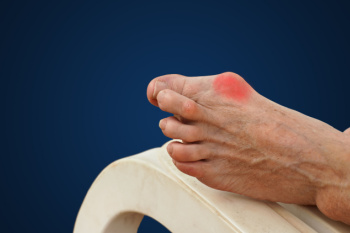
Bunions are bony bumps that form on the joint at the base of the big toe, causing the toe to deviate toward the others. This condition can be painful, particularly when wearing tight shoes or walking. Common causes of bunions include genetics, arthritis, foot injuries, and wearing poorly fitted shoes. Symptoms typically include swelling, redness, and soreness surrounding the big toe joint, along with visible deformity. Non-surgical treatments like wearing wider shoes and using orthotics can alleviate symptoms, while pain relief medications and stretching exercises may also help. In severe cases, surgery might be necessary to realign the toe and relieve pain. Complications can arise if bunions are left untreated, leading to chronic pain or difficulty in walking. Prevention strategies include wearing well-fitting shoes with ample toe space, avoiding high heels, and maintaining good foot care to reduce the risk of developing bunions. If you are experiencing discomfort from a bunion, it is suggested that you schedule an appointment with a podiatrist for appropriate treatment.
If you are suffering from bunions, contact Dr. Tupper of Coshocton Foot Health Center. Our doctor can provide the care you need to keep you pain-free and on your feet.
What Is a Bunion?
A bunion is formed of swollen tissue or an enlargement of boney growth, usually located at the base joint of the toe that connects to the foot. The swelling occurs due to the bones in the big toe shifting inward, which impacts the other toes of the foot. This causes the area around the base of the big toe to become inflamed and painful.
Why Do Bunions Form?
Genetics – Susceptibility to bunions are often hereditary
Stress on the feet – Poorly fitted and uncomfortable footwear that places stress on feet, such as heels, can worsen existing bunions
How Are Bunions Diagnosed?
Doctors often perform two tests – blood tests and x-rays – when trying to diagnose bunions, especially in the early stages of development. Blood tests help determine if the foot pain is being caused by something else, such as arthritis, while x-rays provide a clear picture of your bone structure to your doctor.
How Are Bunions Treated?
- Refrain from wearing heels or similar shoes that cause discomfort
- Select wider shoes that can provide more comfort and reduce pain
- Anti-inflammatory and pain management drugs
- Orthotics or foot inserts
- Surgery
If you have any questions, please feel free to contact our office located in Coshocton, OH . We offer the newest diagnostic and treatment technologies for all your foot care needs.
Key Facts About Ankle and Foot Injuries in Football

Football players are particularly prone to ankle and foot injuries due to the sport’s high-impact nature and frequent lateral movements. Common injuries include sprains, where ligaments are stretched or torn, often from sudden changes in direction or contact. Fractures, such as those of the metatarsals or the ankle bones, occur from direct impacts or severe twists. Tendon injuries, like Achilles tendinitis, also pose a risk due to repetitive strain. Symptoms of these injuries typically include pain, swelling, and difficulty moving the affected area. Prevention strategies include wearing appropriate footwear with good support, incorporating strengthening exercises into training, and practicing proper techniques to reduce the risk of injury. If you have endured a foot or ankle injury while playing football, it is suggested that you visit a podiatrist for treatment, and offer you effective injury prevention techniques.
Sports related foot and ankle injuries require proper treatment before players can go back to their regular routines. For more information, contact Dr. Tupper of Coshocton Foot Health Center. Our doctor can provide the care you need to keep you pain-free and on your feet.
Sports Related Foot and Ankle Injuries
Foot and ankle injuries are a common occurrence when it comes to athletes of any sport. While many athletes dismiss the initial aches and pains, the truth is that ignoring potential foot and ankle injuries can lead to serious problems. As athletes continue to place pressure and strain the area further, a mild injury can turn into something as serious as a rupture and may lead to a permanent disability. There are many factors that contribute to sports related foot and ankle injuries, which include failure to warm up properly, not providing support or wearing bad footwear. Common injuries and conditions athletes face, including:
- Plantar Fasciitis
- Plantar Fasciosis
- Achilles Tendinitis
- Achilles Tendon Rupture
- Ankle Sprains
Sports related injuries are commonly treated using the RICE method. This includes rest, applying ice to the injured area, compression and elevating the ankle. More serious sprains and injuries may require surgery, which could include arthroscopic and reconstructive surgery. Rehabilitation and therapy may also be required in order to get any recovering athlete to become fully functional again. Any unusual aches and pains an athlete sustains must be evaluated by a licensed, reputable medical professional.
If you have any questions please feel free to contact our office located in Coshocton, OH . We offer the newest diagnostic and treatment technologies for all your foot and ankle needs.
Toe Problems Can Indicate Other Maladies
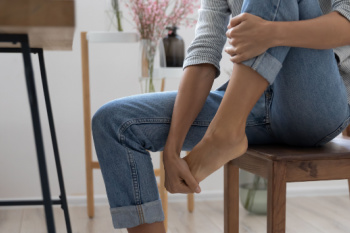
Many people overlook their toes until they experience discomfort, but your toes and toenails can offer significant insights into your overall health. They may reveal signs of infections, side effects from medications, physical trauma, and autoimmune disorders. Toe pain can also point to chemical exposure, diabetes, kidney or liver diseases, and even skin cancer. Health issues often become apparent first in the extremities. Changes such as tingling, burning, and numbness should not be ignored. Discoloration or alterations in nail shape also can be early indicators of conditions like anemia or melanoma. For example, spoon-shaped nails can point to anemia, while dark vertical bands on the toenail might indicate melanoma. Cold or blue toes can be a sign of heart disease, and painful, inflamed toe joints could suggest arthritis. Regular visits to a podiatrist can help to detect these signs early, allowing for prompt treatment and preventing more severe health issues. If you are experiencing toe pain, it is suggested that you schedule an appointment with a podiatrist for an exam, diagnosis, and treatment.
Toe pain can disrupt your daily activities. If you have any concerns, contact Dr. Tupper of Coshocton Foot Health Center. Our doctor can provide the care you need to keep you pain-free and on your feet.
What Causes Toe Pain?
Most severe toe pain is caused due to a sports injury, trauma from dropping something heavy on the toe, or bumping into something rigid. Other problems can develop over time for various reasons.
Toe pain can be caused by one or more ailments. The most common include:
- Trauma
- Sports injury
- Wearing shoes that are too tight
- Arthritis
- Gout
- Corns and calluses
- Hammertoe
- Bunions
- Blisters
- Ingrown toenails
- Sprains
- Fractures (broken bones)
- Dislocations
When to See a Podiatrist
- Severe pain
- Persistent pain that lasts more than a week
- Signs of infection
- Continued swelling
- Pain that prevents walking
Diagnosis
In many cases the cause of toe pain is obvious, but in others, a podiatrist may want to use more advanced methods to determine the problem. These can range from simple visual inspections and sensation tests to X-rays and MRI scans. Prior medical history, family medical history, and any recent physical traumatic events will all be taken into consideration for a proper diagnosis.
Treatment
Treatments for toe pain and injuries vary and may include shoe inserts, padding, taping, medicines, injections, and in some cases, surgery. If you believe that you have broken a toe, please see a podiatrist as soon as possible.
If you have any questions please feel free to contact our office located in Coshocton, OH . We offer the newest diagnostic tools and technology to treat your foot and ankle needs.
Heel Pain Can Be Treated!
Heel Pain Can Be Treated!
Heel Pain Can Be Treated!
Causes and Symptoms of a Broken Pinky Toe
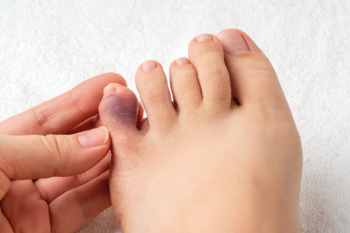
A broken pinky toe, or 5th phalangeal fracture, can occur due to various reasons such as stubbing the toe against furniture or dropping something heavy on it. Symptoms typically include immediate pain, swelling, bruising, and difficulty in moving the toe. Types of fractures can range from minor hairline cracks to complete breaks that displace the bone. Stress fractures develop gradually from repetitive stress, while traumatic fractures occur suddenly from impact or trauma. Diagnosing a broken pinky toe involves a physical examination and possibly imaging tests like X-rays to determine the extent of the injury. Treatment usually involves rest, elevation to reduce the swelling, and buddy taping the toe to its neighbor toe for support. Severe fractures may require immobilization with a splint or walking boot, and in rare cases, surgery to realign the bones for proper healing. If you have endured a broken pinky toe, it is suggested that you consult a podiatrist who can provide you with the appropriate treatment method.
A broken toe can be very painful and lead to complications if not properly fixed. If you have any concerns about your feet, contact Dr. Tupper from Coshocton Foot Health Center. Our doctor will treat your foot and ankle needs.
What to Know About a Broken Toe
Although most people try to avoid foot trauma such as banging, stubbing, or dropping heavy objects on their feet, the unfortunate fact is that it is a common occurrence. Given the fact that toes are positioned in front of the feet, they typically sustain the brunt of such trauma. When trauma occurs to a toe, the result can be a painful break (fracture).
Symptoms of a Broken Toe
- Throbbing pain
- Swelling
- Bruising on the skin and toenail
- The inability to move the toe
- Toe appears crooked or disfigured
- Tingling or numbness in the toe
Generally, it is best to stay off of the injured toe with the affected foot elevated.
Severe toe fractures may be treated with a splint, cast, and in some cases, minor surgery. Due to its position and the pressure it endures with daily activity, future complications can occur if the big toe is not properly treated.
If you have any questions please feel free to contact our office located in Coshocton, OH . We offer the newest diagnostic and treatment technologies for all your foot and ankle needs.
Common Foot Injuries Among Skaters

Skaters often encounter various foot injuries due to the rigorous demands placed on their feet. Wearing tight-fitting boots can lead to issues like lace bite, where the pressure from laces causes pain and inflammation across the top of the foot. Blisters are another common problem, caused by friction and repetitive motion in ill-fitting skates. Achilles tendon injuries are prevalent due to the intense strain during jumps and spins, resulting in pain and stiffness in the back of the ankle. Additionally, skaters may develop malleolar bursitis, inflammation of the fluid-filled sacs around the ankle bones, from constant rubbing against skate boots. Understanding these injuries is essential for skaters to adjust their equipment and practice proper stretching and strengthening exercises. If you enjoy skating and have incurred a foot or ankle injury, it is suggested that you contact a podiatrist who can treat any foot condition, and guide you on additional injury prevention techniques.
Foot Pain
Foot pain can be extremely painful and debilitating. If you have a foot pain, consult with Dr. Tupper from Coshocton Foot Health Center. Our doctor will assess your condition and provide you with quality foot and ankle treatment.
Causes
Foot pain is a very broad condition that could be caused by one or more ailments. The most common include:
- Bunions
- Hammertoes
- Plantar Fasciitis
- Bone Spurs
- Corns
- Tarsal Tunnel Syndrome
- Ingrown Toenails
- Arthritis (such as Gout, Rheumatoid, and Osteoarthritis)
- Flat Feet
- Injury (from stress fractures, broken toe, foot, ankle, Achilles tendon ruptures, and sprains)
- And more
Diagnosis
To figure out the cause of foot pain, podiatrists utilize several different methods. This can range from simple visual inspections and sensation tests to X-rays and MRI scans. Prior medical history, family medical history, and any recent physical traumatic events will all be taken into consideration for a proper diagnosis.
Treatment
Treatment depends upon the cause of the foot pain. Whether it is resting, staying off the foot, or having surgery; podiatrists have a number of treatment options available for foot pain.
If you have any questions, please feel free to contact our office located in Coshocton, OH . We offer the newest diagnostic and treatment technologies for all your foot care needs.
Causes and Relief Options for Achilles Tendonitis
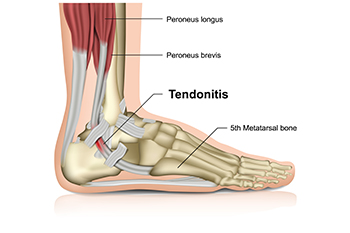
Achilles tendonitis is an inflammation of the Achilles tendon, the band connecting the calf muscles to the heel bone. This condition often arises from overuse, such as repetitive stress from activities like running or jumping. It can also result from a sudden increase in exercise intensity, wearing poor footwear, or tight calf muscles. Symptoms can include pain and stiffness along the tendon, especially in the morning or after physical activity. Relief options focus on reducing inflammation and promoting healing. Resting the affected foot can alleviate pain and swelling. Taking anti-inflammatory medications can also help to provide additional relief. Gentle stretching and strengthening exercises may restore flexibility and prevent future issues. Additionally, wearing supportive footwear and orthotics can also aid recovery. If you have pain in your heel and calf area, it is suggested that you consult a podiatrist who can accurately diagnose and treat an Achilles tendon injury.
Achilles tendon injuries need immediate attention to avoid future complications. If you have any concerns, contact Dr. Tupper of Coshocton Foot Health Center. Our doctor can provide the care you need to keep you pain-free and on your feet.
What Is the Achilles Tendon?
The Achilles tendon is a tendon that connects the lower leg muscles and calf to the heel of the foot. It is the strongest tendon in the human body and is essential for making movement possible. Because this tendon is such an integral part of the body, any injuries to it can create immense difficulties and should immediately be presented to a doctor.
What Are the Symptoms of an Achilles Tendon Injury?
There are various types of injuries that can affect the Achilles tendon. The two most common injuries are Achilles tendinitis and ruptures of the tendon.
Achilles Tendinitis Symptoms
- Inflammation
- Dull to severe pain
- Increased blood flow to the tendon
- Thickening of the tendon
Rupture Symptoms
- Extreme pain and swelling in the foot
- Total immobility
Treatment and Prevention
Achilles tendon injuries are diagnosed by a thorough physical evaluation, which can include an MRI. Treatment involves rest, physical therapy, and in some cases, surgery. However, various preventative measures can be taken to avoid these injuries, such as:
- Thorough stretching of the tendon before and after exercise
- Strengthening exercises like calf raises, squats, leg curls, leg extensions, leg raises, lunges, and leg presses
If you have any questions please feel free to contact our office located in Coshocton, OH . We offer the newest diagnostic tools and technology to treat your foot and ankle needs.
What are Pressure Ulcers on the Feet and Ankles?
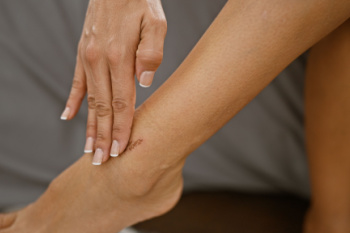 Pressure ulcers on the feet and ankles, also known as pressure sores or bedsores, are injuries to the skin and underlying tissue resulting from prolonged pressure. These ulcers are common in individuals with limited mobility, and can often affect the feet. Intrinsic factors, such as poor nutrition, age, and medical conditions like diabetes, affect the body's ability to heal and withstand pressure. Extrinsic factors involve external forces like friction and prolonged pressure from staying in one position. Symptoms include redness, pain, and open sores, which can progress to deep wounds exposing muscle and bone. Pressure ulcers occur due to reduced blood flow to the affected area, leading to tissue damage. Prevention includes regularly changing positions, using supportive devices, maintaining good nutrition, and keeping the skin clean and dry. Treatment involves relieving pressure, cleaning wounds, and using dressings or medications to promote healing. Advanced cases might require surgical intervention. If you are suffering from a pressure ulcer on your feet or ankles, it is suggested that you schedule an appointment with a podiatrist as soon as possible for care.
Pressure ulcers on the feet and ankles, also known as pressure sores or bedsores, are injuries to the skin and underlying tissue resulting from prolonged pressure. These ulcers are common in individuals with limited mobility, and can often affect the feet. Intrinsic factors, such as poor nutrition, age, and medical conditions like diabetes, affect the body's ability to heal and withstand pressure. Extrinsic factors involve external forces like friction and prolonged pressure from staying in one position. Symptoms include redness, pain, and open sores, which can progress to deep wounds exposing muscle and bone. Pressure ulcers occur due to reduced blood flow to the affected area, leading to tissue damage. Prevention includes regularly changing positions, using supportive devices, maintaining good nutrition, and keeping the skin clean and dry. Treatment involves relieving pressure, cleaning wounds, and using dressings or medications to promote healing. Advanced cases might require surgical intervention. If you are suffering from a pressure ulcer on your feet or ankles, it is suggested that you schedule an appointment with a podiatrist as soon as possible for care.
Wound care is an important part in dealing with diabetes. If you have diabetes and a foot wound or would like more information about wound care for diabetics, consult with Dr. Tupper from Coshocton Foot Health Center. Our doctor will assess your condition and provide you with quality foot and ankle treatment.
What Is Wound Care?
Wound care is the practice of taking proper care of a wound. This can range from the smallest to the largest of wounds. While everyone can benefit from proper wound care, it is much more important for diabetics. Diabetics often suffer from poor blood circulation which causes wounds to heal much slower than they would in a non-diabetic.
What Is the Importance of Wound Care?
While it may not seem apparent with small ulcers on the foot, for diabetics, any size ulcer can become infected. Diabetics often also suffer from neuropathy, or nerve loss. This means they might not even feel when they have an ulcer on their foot. If the wound becomes severely infected, amputation may be necessary. Therefore, it is of the upmost importance to properly care for any and all foot wounds.
How to Care for Wounds
The best way to care for foot wounds is to prevent them. For diabetics, this means daily inspections of the feet for any signs of abnormalities or ulcers. It is also recommended to see a podiatrist several times a year for a foot inspection. If you do have an ulcer, run the wound under water to clear dirt from the wound; then apply antibiotic ointment to the wound and cover with a bandage. Bandages should be changed daily and keeping pressure off the wound is smart. It is advised to see a podiatrist, who can keep an eye on it.
If you have any questions, please feel free to contact our office located in Coshocton, OH . We offer the newest diagnostic and treatment technologies for all your foot care needs.
More...
Reminder: When Was the Last Time...?
Key Strategies for Preventing Gout
 Gout, a painful form of arthritis that often affects the big toe, can be prevented through lifestyle and dietary changes. Maintaining a healthy weight also reduces the pain of gout by decreasing the stress on joints. Eating a balanced diet that limits purine-rich foods, such as red meat, shellfish, and sugary beverages, helps lower uric acid levels. Staying well-hydrated by drinking plenty of water aids in flushing out excess uric acid from the body. Regular physical activity not only supports weight management but also improves overall joint health. Limiting alcohol consumption, especially beer, can help prevent gout flare-ups. Additionally, managing medical conditions like hypertension and diabetes effectively reduces the risk. For those with a history of gout, regular check-ups and prescribed medications can help maintain lower uric acid levels. Gout in the big toe can cause severe pain and discomfort. If you are experiencing gout attacks, it is suggested that you are under the care of a podiatrist who can help you manage this condition.
Gout, a painful form of arthritis that often affects the big toe, can be prevented through lifestyle and dietary changes. Maintaining a healthy weight also reduces the pain of gout by decreasing the stress on joints. Eating a balanced diet that limits purine-rich foods, such as red meat, shellfish, and sugary beverages, helps lower uric acid levels. Staying well-hydrated by drinking plenty of water aids in flushing out excess uric acid from the body. Regular physical activity not only supports weight management but also improves overall joint health. Limiting alcohol consumption, especially beer, can help prevent gout flare-ups. Additionally, managing medical conditions like hypertension and diabetes effectively reduces the risk. For those with a history of gout, regular check-ups and prescribed medications can help maintain lower uric acid levels. Gout in the big toe can cause severe pain and discomfort. If you are experiencing gout attacks, it is suggested that you are under the care of a podiatrist who can help you manage this condition.
Gout is a painful condition that can be treated. If you are seeking treatment, contact Dr. Tupper from Coshocton Foot Health Center. Our doctor will treat your foot and ankle needs.
What Is Gout?
Gout is a form of arthritis that is characterized by sudden, severe attacks of pain, redness, and tenderness in the joints. The condition usually affects the joint at the base of the big toe. A gout attack can occur at any random time, such as the middle of the night while you are asleep.
Symptoms
- Intense Joint Pain - Usually around the large joint of your big toe, and it most severe within the first four to twelve hours
- Lingering Discomfort - Joint discomfort may last from a few days to a few weeks
- Inflammation and Redness -Affected joints may become swollen, tender, warm and red
- Limited Range of Motion - May experience a decrease in joint mobility
Risk Factors
- Genetics - If family members have gout, you’re more likely to have it
- Medications - Diuretic medications can raise uric acid levels
- Gender/Age - Gout is more common in men until the age of 60. It is believed that estrogen protects women until that point
- Diet - Eating red meat and shellfish increases your risk
- Alcohol - Having more than two alcoholic drinks per day increases your risk
- Obesity - Obese people are at a higher risk for gout
Prior to visiting your podiatrist to receive treatment for gout, there are a few things you should do beforehand. If you have gout you should write down your symptoms--including when they started and how often you experience them, important medical information you may have, and any questions you may have. Writing down these three things will help your podiatrist in assessing your specific situation so that he or she may provide the best route of treatment for you.
If you have any questions, please feel free to contact our office located in Coshocton, OH . We offer the newest diagnostic and treatment technologies for all your foot care needs.
Causes of Peripheral Neuropathy
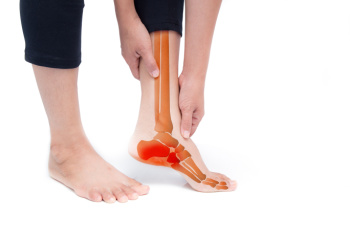 Peripheral neuropathy is a condition resulting from damage to the peripheral nerves, which connect the brain and spinal cord to the rest of the body. It often occurs due to diabetes, infections, injuries, or exposure to toxins. Diagnosis involves a thorough medical history review, physical examination, and tests like nerve conduction studies, electromyography, or EMGs, and blood tests to determine underlying causes. Symptoms can include numbness, tingling, burning sensations, and pain, usually starting in the hands and feet. Muscle weakness and sensitivity to touch are also common. These symptoms can lead to complications like balance problems, foot ulcers, and infections due to unnoticed injuries. Treatment focuses on managing the underlying cause, relieving symptoms, and preventing complications. This may include medications, gentle exercises, and lifestyle changes such as improving diet and controlling blood sugar levels. If you have peripheral neuropathy, it is suggested that you visit a podiatrist for a proper diagnosis and management.
Peripheral neuropathy is a condition resulting from damage to the peripheral nerves, which connect the brain and spinal cord to the rest of the body. It often occurs due to diabetes, infections, injuries, or exposure to toxins. Diagnosis involves a thorough medical history review, physical examination, and tests like nerve conduction studies, electromyography, or EMGs, and blood tests to determine underlying causes. Symptoms can include numbness, tingling, burning sensations, and pain, usually starting in the hands and feet. Muscle weakness and sensitivity to touch are also common. These symptoms can lead to complications like balance problems, foot ulcers, and infections due to unnoticed injuries. Treatment focuses on managing the underlying cause, relieving symptoms, and preventing complications. This may include medications, gentle exercises, and lifestyle changes such as improving diet and controlling blood sugar levels. If you have peripheral neuropathy, it is suggested that you visit a podiatrist for a proper diagnosis and management.
Neuropathy
Neuropathy can be a potentially serious condition, especially if it is left undiagnosed. If you have any concerns that you may be experiencing nerve loss in your feet, consult with Dr. Tupper from Coshocton Foot Health Center. Our doctor will assess your condition and provide you with quality foot and ankle treatment for neuropathy.
What Is Neuropathy?
Neuropathy is a condition that leads to damage to the nerves in the body. Peripheral neuropathy, or neuropathy that affects your peripheral nervous system, usually occurs in the feet. Neuropathy can be triggered by a number of different causes. Such causes include diabetes, infections, cancers, disorders, and toxic substances.
Symptoms of Neuropathy Include:
- Numbness
- Sensation loss
- Prickling and tingling sensations
- Throbbing, freezing, burning pains
- Muscle weakness
Those with diabetes are at serious risk due to being unable to feel an ulcer on their feet. Diabetics usually also suffer from poor blood circulation. This can lead to the wound not healing, infections occurring, and the limb may have to be amputated.
Treatment
To treat neuropathy in the foot, podiatrists will first diagnose the cause of the neuropathy. Figuring out the underlying cause of the neuropathy will allow the podiatrist to prescribe the best treatment, whether it be caused by diabetes, toxic substance exposure, infection, etc. If the nerve has not died, then it’s possible that sensation may be able to return to the foot.
Pain medication may be issued for pain. Electrical nerve stimulation can be used to stimulate nerves. If the neuropathy is caused from pressure on the nerves, then surgery may be necessary.
If you have any questions, please feel free to contact our office located in Coshocton, OH . We offer the newest diagnostic and treatment technologies for all your foot care needs.
Athlete’s Foot Relief and Prevention
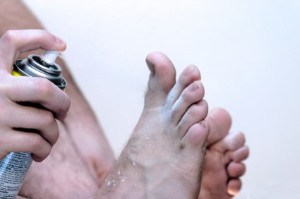 Athlete's foot is a common fungal infection affecting the skin on the feet, especially between the toes. It occurs due to the growth of dermatophytes, a type of fungus that thrives in warm, moist environments like locker rooms, showers, and even sweaty shoes. Symptoms include itching, burning, and stinging sensations, in addition to red, scaly, and cracked skin. Sometimes, it can also cause blisters or ulcers. Athletes and individuals who frequently wear tight-fitting shoes or who have sweaty feet are at higher risk. Diagnosis is typically made through a physical examination, and sometimes a skin scraping to confirm the presence of the fungus. Possible relief can include antifungal creams, powders, or sprays, and in more severe cases, oral medications. To prevent athlete’s foot, keep feet clean and dry, change socks regularly, wear breathable footwear, and avoid walking barefoot in communal areas. If you have athlete’s foot with persistent or severe symptoms, it is suggested that you visit a podiatrist for advanced treatment which often includes prescribed medication.
Athlete's foot is a common fungal infection affecting the skin on the feet, especially between the toes. It occurs due to the growth of dermatophytes, a type of fungus that thrives in warm, moist environments like locker rooms, showers, and even sweaty shoes. Symptoms include itching, burning, and stinging sensations, in addition to red, scaly, and cracked skin. Sometimes, it can also cause blisters or ulcers. Athletes and individuals who frequently wear tight-fitting shoes or who have sweaty feet are at higher risk. Diagnosis is typically made through a physical examination, and sometimes a skin scraping to confirm the presence of the fungus. Possible relief can include antifungal creams, powders, or sprays, and in more severe cases, oral medications. To prevent athlete’s foot, keep feet clean and dry, change socks regularly, wear breathable footwear, and avoid walking barefoot in communal areas. If you have athlete’s foot with persistent or severe symptoms, it is suggested that you visit a podiatrist for advanced treatment which often includes prescribed medication.
Athlete’s Foot
Athlete’s foot is often an uncomfortable condition to experience. Thankfully, podiatrists specialize in treating athlete’s foot and offer the best treatment options. If you have any questions about athlete’s foot, consult with Dr. Tupper from Coshocton Foot Health Center. Our doctor will assess your condition and provide you with quality treatment.
What Is Athlete’s Foot?
Tinea pedis, more commonly known as athlete’s foot, is a non-serious and common fungal infection of the foot. Athlete’s foot is contagious and can be contracted by touching someone who has it or infected surfaces. The most common places contaminated by it are public showers, locker rooms, and swimming pools. Once contracted, it grows on feet that are left inside moist, dark, and warm shoes and socks.
Prevention
The most effective ways to prevent athlete’s foot include:
- Thoroughly washing and drying feet
- Avoid going barefoot in locker rooms and public showers
- Using shower shoes in public showers
- Wearing socks that allow the feet to breathe
- Changing socks and shoes frequently if you sweat a lot
Symptoms
Athlete’s foot initially occurs as a rash between the toes. However, if left undiagnosed, it can spread to the sides and bottom of the feet, toenails, and if touched by hand, the hands themselves. Symptoms include:
- Redness
- Burning
- Itching
- Scaly and peeling skin
Diagnosis and Treatment
Diagnosis is quick and easy. Skin samples will be taken and either viewed under a microscope or sent to a lab for testing. Sometimes, a podiatrist can diagnose it based on simply looking at it. Once confirmed, treatment options include oral and topical antifungal medications.
If you have any questions, please feel free to contact our office located in Coshocton, OH . We offer the newest diagnostic and treatment technologies for all your foot care needs.



